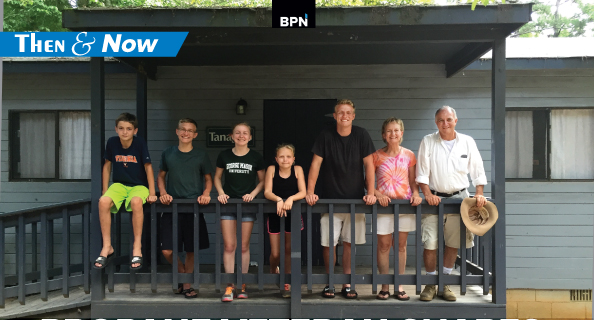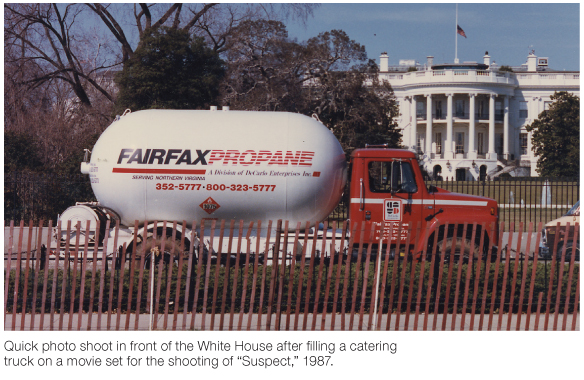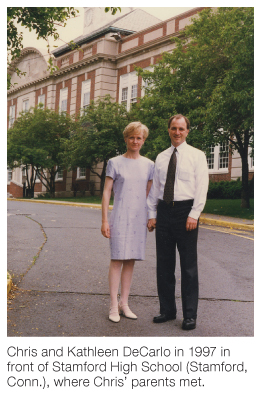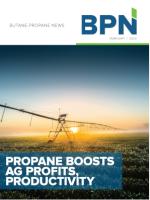Friday, February 28, 2020
(February 28, 2020) — At the age of 20, while still a student, Chris DeCarlo started his first business. In the 40 years since then, he launched a couple more, the principal business being Fairfax Propane (Fairfax, Va.). He also married and, with his wife, is raising five children.

Over the last year or so, he has also piloted a new project—writing, publishing, and now promoting a handbook for teenagers. In it, he shares his experiences in business and in life, and explains how today’s teens can think strategically, prioritize the right things, and recognize opportunities to build a career and a meaningful life.
“What Now? The Teen Handbook” is primarily written for young people between the ages of 16 and 22, but DeCarlo says its buyers are likely to be concerned parents and grandparents who will then share it with their children or grandchildren.
“What I’ve learned in business is, you have to solve a problem,” he tells BPN. “What is a problem for parents? Teenagers—how to raise them and help them mature.”
 His 40 years as a small business owner have given DeCarlo a variety of stories to tell and knowledge to share. Raised by parents who worked for the federal government and in higher education, DeCarlo began preparing for adulthood by studying electrical engineering at Georgia Tech. He did not enjoy it, though, and he did not like the potential future he saw during a visit to the office of some working engineers. He left Georgia Tech after two years.
His 40 years as a small business owner have given DeCarlo a variety of stories to tell and knowledge to share. Raised by parents who worked for the federal government and in higher education, DeCarlo began preparing for adulthood by studying electrical engineering at Georgia Tech. He did not enjoy it, though, and he did not like the potential future he saw during a visit to the office of some working engineers. He left Georgia Tech after two years.
Returning home to Virginia, he enrolled in business classes. While still a student, he started his first business in 1979 by renting a gas station.
“I was always one to think outside the box and project into the future,” DeCarlo says. “I enjoyed challenging myself and I saw that business owners seemed to have an improved quality of life and flexibility.
“I also saw that the owner of the gas station down the street was doing pretty well and he didn’t have to take a lot of calculus to be successful. So I thought owning a business couldn’t be that hard if one could just figure out the formula.”
In addition to selling gasoline, DeCarlo began renting cars he had purchased used. Later, he also began renting trucks. Then, he noticed that people were stopping for directions to where they could buy propane. DeCarlo investigated that business and began selling propane in 1981.

“That was just when gas grills were becoming popular,” he says. “There was limited competition and people would call desperate for someone who could help them with propane-related products and services. Our record for refills occurred on a Saturday of Memorial Day weekend when we filled 630 20-lb cylinders. I caught the industry’s growth phase just right.”
Then, when he started getting calls from construction sites needing temporary heat, he added 100-lb cylinders and a truck, growing to 3000 cylinders. He serendipitously found some industrial land for a propane storage tank and was able to begin installing tanks at homes and delivering propane in 1986. Nearly 40 years later, he still runs Fairfax Propane, even though he stopped expanding it 20 years ago. He kept it small for many reasons, including all the inherent problems with the business model.
Innovating New Products
In 2008, in an effort to offset the seasonality of propane demand, DeCarlo founded Easy Stone Center (Vienna, Va.) to provide custom natural stone cutting and carving using computer numeric controlled (CNC) machines.
The company fabricates both simple and complicated pieces and ships them nationwide. Its products range from simple 8-ft fireplace hearths to intricate custom fireplace surrounds. Pieces are also fabricated for restoration products for everything from row house steps, to sandstone crosses at Georgetown University, to marble pieces for the U.S. Capitol.
He now recognizes that stone fabrication is very challenging, difficult to scale, more complicated than he ever imagined, and probably not a good investment of time and resources.
Experience with CNC machines did play a part in DeCarlo’s next enterprise. Having learned from a patent attorney that the success of many companies is anchored in intellectual property, in 2013, he turned his attention to inventing a new product. One day, while watching one of his sons shoot hoops, he got the idea to mount a backboard to a robotic arm that had been used for stone fabrication. The idea was to create a moving sports goal so a solo player could practice in a simulated dynamic game environment. With this and later additions, such as sensors that can measure how close to the center of the hoop the ball lands, DeCarlo has secured four patents, the most recent being to use two or more moving sports goals in a game.
One of his most recent applications is for a tunnel filled with thousands of horizontal and vertical laser beams, spaced as close as possible to each other, for the purpose of measuring the various deviations of a pitched baseball as it travels to a catcher’s mitt. Pitch accuracy can also be measured with the use of the robotic sports goal for manipulating the target, which has been outfitted with impact sensors, for various possible positions a catcher might choose.
Another pending application is for a propane cylinder cabinet with doors on the front and back such that a forklift can lift the cabinet and move it to the bed of a truck stocked with prefilled cylinders for exchange, without having to lift the cabinet from the back. This simple invention will reduce the majority of the physical work related to cylinder handling.

“The biggest part of business I have learned is, you have to keep evolving while you have the money to do it,” DeCarlo says. “You have to keep innovating even when you think you don’t have to. As your markets mature, you need to have new products and services in development.” He admits that being innovative is hard and risky.
Sharing Knowledge
When he wrote his handbook for teens, DeCarlo incorporated knowledge he had gained as a business owner and as an active member of the propane industry. “Being a business owner has provided me with a huge focus group for engaging with different people and learning every day,” he says. He also credits mentors and peers from other companies in the industry.
“My participation in the propane industry helped me write the book in many ways,” DeCarlo says. “The open and welcoming camaraderie of the industry provided a solid foundation for my own personal growth and development, and the relationships I made provided me with a lot of knowledge about human behavior and life, as well as insight into how the real world works.”
In addition to his own stories, he has weaved stories from the lives of others associated with the industry into his book. Among those whose stories are shared in the book are Marty Braithwaite, Woodgate Petroleum (Stephens City, Va.); Dean Haldeman, Blue Flame Inc. (Berkeley Springs, W.Va.); David Archer, ARCOSA Tank; and Steve Barton of Gas Equipment Co. Inc.
“Their personal stories and perspectives helped anchor the book in the realities of life,” DeCarlo says.
Of course, DeCarlo’s other life experiences have provided material for the book as well. He has been married for 25 years and has five children, ages 13 to 21. When he launched “What Now?” last summer by distributing copies at the national convention of the American Library Association, he was asked about his credentials. He answered, “I have five teenagers!”
DeCarlo has also returned to school recently, taking undergraduate classes for the first time in 40 years. His personal classroom, homework, and testing experiences and the tales he has heard from teachers and students have been incorporated into the handbook as a warning. He explains, “Technology is having a negative effect on the students, teachers, and schools, and parents don’t realize how much college has changed for the worse from when they were in school.”
In one chapter of his book, DeCarlo asks readers to ask themselves, “Who are you?” He guides them in taking an inventory of their characteristics and their skills. He explains he is helping them assess themselves like an employer would—“Would you want to hire yourself?”
He tells BPN, “As a business owner, I recognize the traits that are important.”
In another chapter, DeCarlo outlines the “phases of life,” with special focus on the education and career phases. “It is important to understand each phase and to understand what you should be accomplishing as you progress through each and why each is important to your future,” he writes.
Other chapters in “What Now?” cover relationships; “pitfalls, risks, and dungeons”; and coming of age. Addenda include a reproduction of the death certificate of a friend who died only three weeks after they had both graduated from high school, and a eulogy for a next-door neighbor and auto mechanic who became a mentor when DeCarlo was in his teens.
Developing Skills, Fundraising
Summarizing for BPN the experiences in business that have influenced the advice he gives in the book, DeCarlo says, “As in business, the need for one to act maturely and think strategically are two of my important themes, and I caution readers about accepting the school version of how the world works versus reality.”
He adds, “I also highlight my interpretation of the difference between being in school and being in business on page 271. I explain that, ‘in school you are told what you need to know, given a test on the material, and it is graded for you. In business you have to figure out what you need to know, test yourself, and grade your test every day.’”
Along with sharing this advice, DeCarlo hopes his book can be used to help parents and teens learn about business principles firsthand. He has restricted the channels of distribution of the book, selling it priced at retail through his own online store but only offering it with wholesale pricing to PTAs and student clubs. He explains, “I want PTAs and student clubs to be the primary channel of distribution, without outside competition, so they can have a lucrative and efficient means of raising funds for their particular academic needs, interests, and activities.”
DeCarlo invites readers of BPN to call or text him to request complimentary copies of “What Now? The Teen Handbook.” He can be reached on his cell phone, (703) 973-8102. — Steve Relyea

Over the last year or so, he has also piloted a new project—writing, publishing, and now promoting a handbook for teenagers. In it, he shares his experiences in business and in life, and explains how today’s teens can think strategically, prioritize the right things, and recognize opportunities to build a career and a meaningful life.
“What Now? The Teen Handbook” is primarily written for young people between the ages of 16 and 22, but DeCarlo says its buyers are likely to be concerned parents and grandparents who will then share it with their children or grandchildren.
“What I’ve learned in business is, you have to solve a problem,” he tells BPN. “What is a problem for parents? Teenagers—how to raise them and help them mature.”
 His 40 years as a small business owner have given DeCarlo a variety of stories to tell and knowledge to share. Raised by parents who worked for the federal government and in higher education, DeCarlo began preparing for adulthood by studying electrical engineering at Georgia Tech. He did not enjoy it, though, and he did not like the potential future he saw during a visit to the office of some working engineers. He left Georgia Tech after two years.
His 40 years as a small business owner have given DeCarlo a variety of stories to tell and knowledge to share. Raised by parents who worked for the federal government and in higher education, DeCarlo began preparing for adulthood by studying electrical engineering at Georgia Tech. He did not enjoy it, though, and he did not like the potential future he saw during a visit to the office of some working engineers. He left Georgia Tech after two years.Returning home to Virginia, he enrolled in business classes. While still a student, he started his first business in 1979 by renting a gas station.
“I was always one to think outside the box and project into the future,” DeCarlo says. “I enjoyed challenging myself and I saw that business owners seemed to have an improved quality of life and flexibility.
“I also saw that the owner of the gas station down the street was doing pretty well and he didn’t have to take a lot of calculus to be successful. So I thought owning a business couldn’t be that hard if one could just figure out the formula.”
In addition to selling gasoline, DeCarlo began renting cars he had purchased used. Later, he also began renting trucks. Then, he noticed that people were stopping for directions to where they could buy propane. DeCarlo investigated that business and began selling propane in 1981.

“That was just when gas grills were becoming popular,” he says. “There was limited competition and people would call desperate for someone who could help them with propane-related products and services. Our record for refills occurred on a Saturday of Memorial Day weekend when we filled 630 20-lb cylinders. I caught the industry’s growth phase just right.”
Then, when he started getting calls from construction sites needing temporary heat, he added 100-lb cylinders and a truck, growing to 3000 cylinders. He serendipitously found some industrial land for a propane storage tank and was able to begin installing tanks at homes and delivering propane in 1986. Nearly 40 years later, he still runs Fairfax Propane, even though he stopped expanding it 20 years ago. He kept it small for many reasons, including all the inherent problems with the business model.
Innovating New Products
In 2008, in an effort to offset the seasonality of propane demand, DeCarlo founded Easy Stone Center (Vienna, Va.) to provide custom natural stone cutting and carving using computer numeric controlled (CNC) machines.
The company fabricates both simple and complicated pieces and ships them nationwide. Its products range from simple 8-ft fireplace hearths to intricate custom fireplace surrounds. Pieces are also fabricated for restoration products for everything from row house steps, to sandstone crosses at Georgetown University, to marble pieces for the U.S. Capitol.
He now recognizes that stone fabrication is very challenging, difficult to scale, more complicated than he ever imagined, and probably not a good investment of time and resources.
Experience with CNC machines did play a part in DeCarlo’s next enterprise. Having learned from a patent attorney that the success of many companies is anchored in intellectual property, in 2013, he turned his attention to inventing a new product. One day, while watching one of his sons shoot hoops, he got the idea to mount a backboard to a robotic arm that had been used for stone fabrication. The idea was to create a moving sports goal so a solo player could practice in a simulated dynamic game environment. With this and later additions, such as sensors that can measure how close to the center of the hoop the ball lands, DeCarlo has secured four patents, the most recent being to use two or more moving sports goals in a game.
One of his most recent applications is for a tunnel filled with thousands of horizontal and vertical laser beams, spaced as close as possible to each other, for the purpose of measuring the various deviations of a pitched baseball as it travels to a catcher’s mitt. Pitch accuracy can also be measured with the use of the robotic sports goal for manipulating the target, which has been outfitted with impact sensors, for various possible positions a catcher might choose.
Another pending application is for a propane cylinder cabinet with doors on the front and back such that a forklift can lift the cabinet and move it to the bed of a truck stocked with prefilled cylinders for exchange, without having to lift the cabinet from the back. This simple invention will reduce the majority of the physical work related to cylinder handling.

“The biggest part of business I have learned is, you have to keep evolving while you have the money to do it,” DeCarlo says. “You have to keep innovating even when you think you don’t have to. As your markets mature, you need to have new products and services in development.” He admits that being innovative is hard and risky.
Sharing Knowledge
When he wrote his handbook for teens, DeCarlo incorporated knowledge he had gained as a business owner and as an active member of the propane industry. “Being a business owner has provided me with a huge focus group for engaging with different people and learning every day,” he says. He also credits mentors and peers from other companies in the industry.
“My participation in the propane industry helped me write the book in many ways,” DeCarlo says. “The open and welcoming camaraderie of the industry provided a solid foundation for my own personal growth and development, and the relationships I made provided me with a lot of knowledge about human behavior and life, as well as insight into how the real world works.”
In addition to his own stories, he has weaved stories from the lives of others associated with the industry into his book. Among those whose stories are shared in the book are Marty Braithwaite, Woodgate Petroleum (Stephens City, Va.); Dean Haldeman, Blue Flame Inc. (Berkeley Springs, W.Va.); David Archer, ARCOSA Tank; and Steve Barton of Gas Equipment Co. Inc.
“Their personal stories and perspectives helped anchor the book in the realities of life,” DeCarlo says.
Of course, DeCarlo’s other life experiences have provided material for the book as well. He has been married for 25 years and has five children, ages 13 to 21. When he launched “What Now?” last summer by distributing copies at the national convention of the American Library Association, he was asked about his credentials. He answered, “I have five teenagers!”
DeCarlo has also returned to school recently, taking undergraduate classes for the first time in 40 years. His personal classroom, homework, and testing experiences and the tales he has heard from teachers and students have been incorporated into the handbook as a warning. He explains, “Technology is having a negative effect on the students, teachers, and schools, and parents don’t realize how much college has changed for the worse from when they were in school.”
In one chapter of his book, DeCarlo asks readers to ask themselves, “Who are you?” He guides them in taking an inventory of their characteristics and their skills. He explains he is helping them assess themselves like an employer would—“Would you want to hire yourself?”
He tells BPN, “As a business owner, I recognize the traits that are important.”
In another chapter, DeCarlo outlines the “phases of life,” with special focus on the education and career phases. “It is important to understand each phase and to understand what you should be accomplishing as you progress through each and why each is important to your future,” he writes.
Other chapters in “What Now?” cover relationships; “pitfalls, risks, and dungeons”; and coming of age. Addenda include a reproduction of the death certificate of a friend who died only three weeks after they had both graduated from high school, and a eulogy for a next-door neighbor and auto mechanic who became a mentor when DeCarlo was in his teens.
Developing Skills, Fundraising
Summarizing for BPN the experiences in business that have influenced the advice he gives in the book, DeCarlo says, “As in business, the need for one to act maturely and think strategically are two of my important themes, and I caution readers about accepting the school version of how the world works versus reality.”
He adds, “I also highlight my interpretation of the difference between being in school and being in business on page 271. I explain that, ‘in school you are told what you need to know, given a test on the material, and it is graded for you. In business you have to figure out what you need to know, test yourself, and grade your test every day.’”
Along with sharing this advice, DeCarlo hopes his book can be used to help parents and teens learn about business principles firsthand. He has restricted the channels of distribution of the book, selling it priced at retail through his own online store but only offering it with wholesale pricing to PTAs and student clubs. He explains, “I want PTAs and student clubs to be the primary channel of distribution, without outside competition, so they can have a lucrative and efficient means of raising funds for their particular academic needs, interests, and activities.”
DeCarlo invites readers of BPN to call or text him to request complimentary copies of “What Now? The Teen Handbook.” He can be reached on his cell phone, (703) 973-8102. — Steve Relyea




